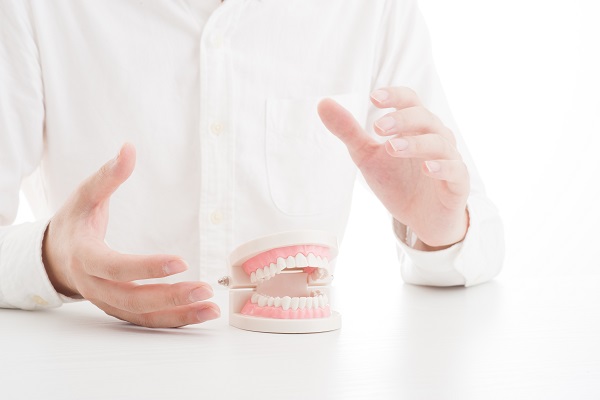What Are Partial Dentures?

Partial dentures are a popular replacement option for missing teeth. You could potentially benefit from them if you have lost some of your permanent teeth, but there are still some healthy ones that remain in the jaw. Your dentist can explain if you are a candidate for partials. If you are, you should learn all you can about them before you decide.
Common questions about partial dentures
If you are thinking about partials, you probably have many questions about them. Here are some of the things that people typically want to know.
Who qualifies for partial dentures?
Partial dentures are typically recommended for someone who has two or more missing teeth that are right next to each other. However, if you have multiple missing teeth that are not right next to each other, or if you are only missing one tooth, then you may need to seek out another treatment option.
Why would a dentist recommend partial dentures?
Tooth loss can cause extensive changes in the jaw. Because these changes can be detrimental, dentists prefer to leave healthy teeth in the jaw whenever possible and save extraction as a last resort. Partials are a way to retain healthy teeth while replacing those that are missing for a return to normal function and approximate appearance.
How are partials different from full dentures?
The most obvious difference is that a full set of dentures replaces all the teeth in the mouth while partials only replace some of them. However, there are other variations between the two. Partials have parts that full dentures lack. For example, partials usually have at least some metal components, while full sets typically have none.
How durable are partial dentures?
The durability of your partial dentures depends on the materials used and whether your healthcare provider gave you temporary or permanent partial dentures. Typically, metal dentures are the most durable, while plastic ones are easier to damage. There are also hybrids that are somewhere in the middle. Keep in mind that the term "permanent denture" is often misleading, too. Even a permanent denture option will need to be replaced every 5 or 10 years due to wear and tear.
What are the different parts of a partial denture?
A partial denture usually consists of these basic parts:
- Replacement teeth
- Plastic base to hold the replacement teeth
- Metal framework to support the plastic base with the teeth in it
How do partials stay in the mouth?
Partials stay in place partly because of clasps or other connectors that allow them to attach to the remaining adjacent teeth. The connections anchor the partial and hold it in place. Clasps may be made of plastic or metal. Other attachments may be more advanced. If desired, you can also use dental adhesive on your partials to help keep it from moving.
What are some of the different types of partials?
There are several ways to categorize partial dentures. They can be classified according to the materials used to make them, e.g., plastic bases versus metal bases versus lightweight thermoplastics with no metal also called flexible dentures.
Another way of categorizing partials is by the location of the teeth they are replacing. If the missing teeth are in the back, they are posterior partials, whereas anterior partials replace teeth missing from the front of the mouth.
How do you eat with partials?
When you first get your partial, you cannot go immediately back to eating the way you did before your tooth loss. It takes time to adjust to your new dental appliances. During this time, you should cut your food into small pieces and choose soft foods that are easier to chew. To maintain even pressure, you should practice chewing on both sides of the mouth at the same time. Even after the adjustment period, you should avoid hard or sticky foods.
Conclusion
If you have healthy teeth remaining in your jaw and your dentist wants you to keep them, a partial denture may be an option for the restoration of your missing teeth. Always be sure to talk through each option you have before making a decision. This way, you can be sure that you are making the right choice for yourself and your medical needs. Finally, be sure to give yourself time to adjust to the new dentures. It can take up to one month to use them properly.
Request an appointment here: https://www.carmelsmilesdentist.com or call Smiles in the Village Dentistry at (317) 218-7985 for an appointment in our Carmel office.
Check out what others are saying about our dental services on Yelp: Dentures in Carmel, IN.
Related Posts
A tooth replacement procedure is vital if you are missing teeth. You will be happy to know that there are multiple options available to restore your smile. If you are missing a few or many teeth but have healthy natural teeth remaining, partial dentures make a lot of sense. This solution can improve your appearance…
When you begin wearing dentures, you may experience discomfort for a short period while you are adjusting. However, this process does not have to be complicated. There are many ways to make the adjustment more manageable and more enjoyable.Here are three reasons you can easily get through the first few weeks of wearing dentures.If you…
Getting dentures is the most affordable way to restore lost teeth. These removable dental replacements are easy to acquire as well. Upper and lower dental replacements are custom-fit. Your dentist can recommend them under the right conditions. If you want to know when dentures can replace missing teeth, here are the details.Dental implants are the…
Dentures are oral appliances that allow you to get a beautiful smile and enjoy oral functions after losing one or more teeth. The adjustment process might be an issue for patients getting dentures for the first time, but with a little dedication and patience, dentures should soon feel normal in the mouth.When it comes to…


